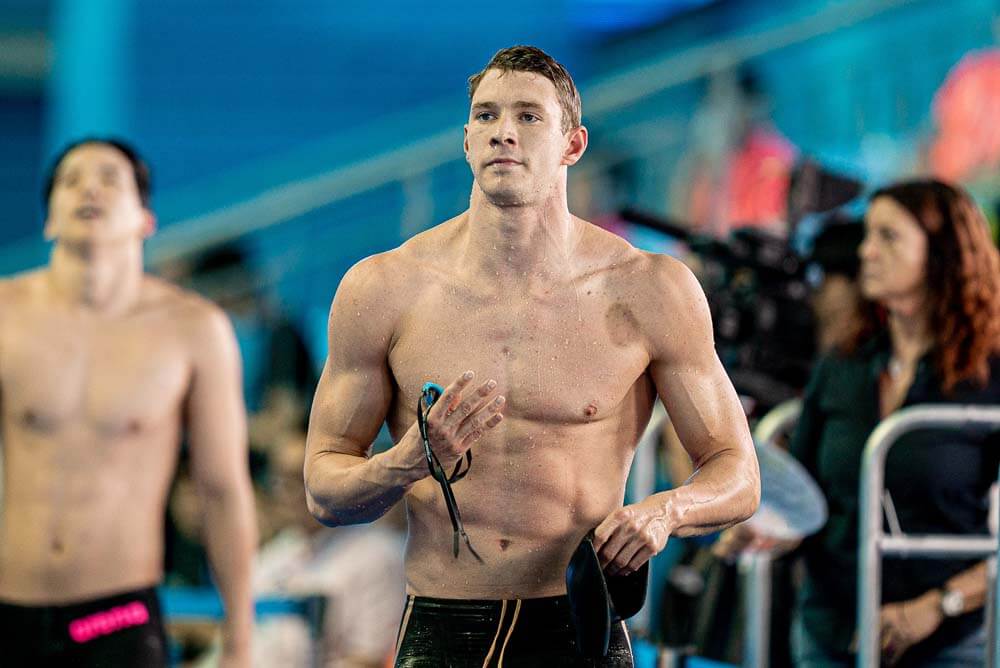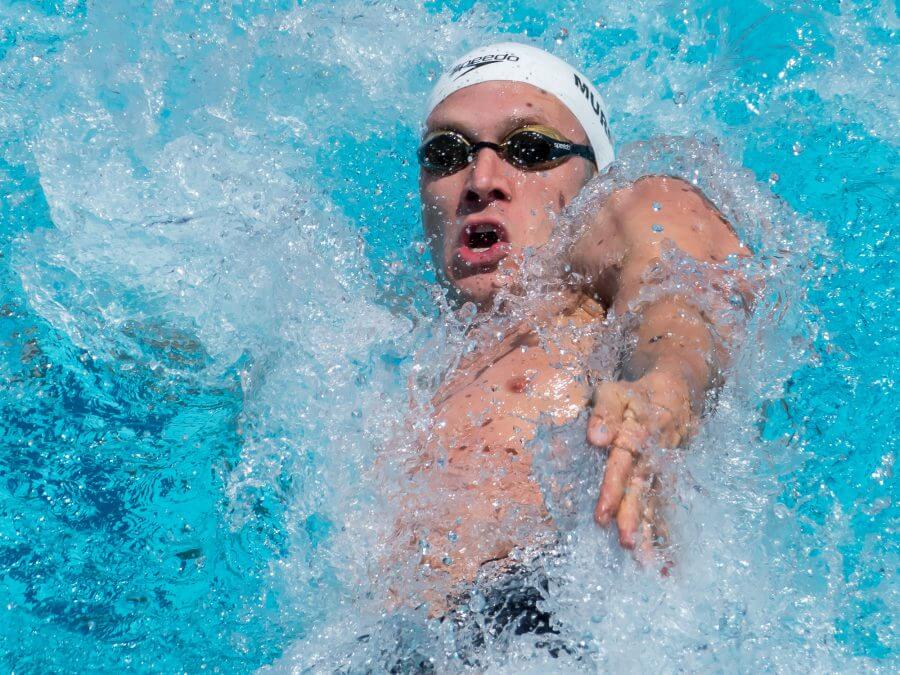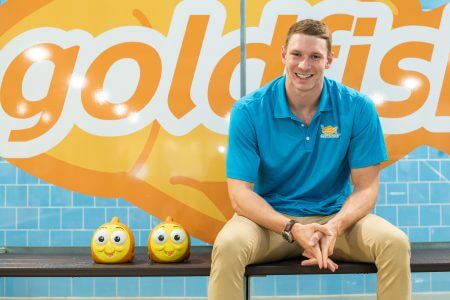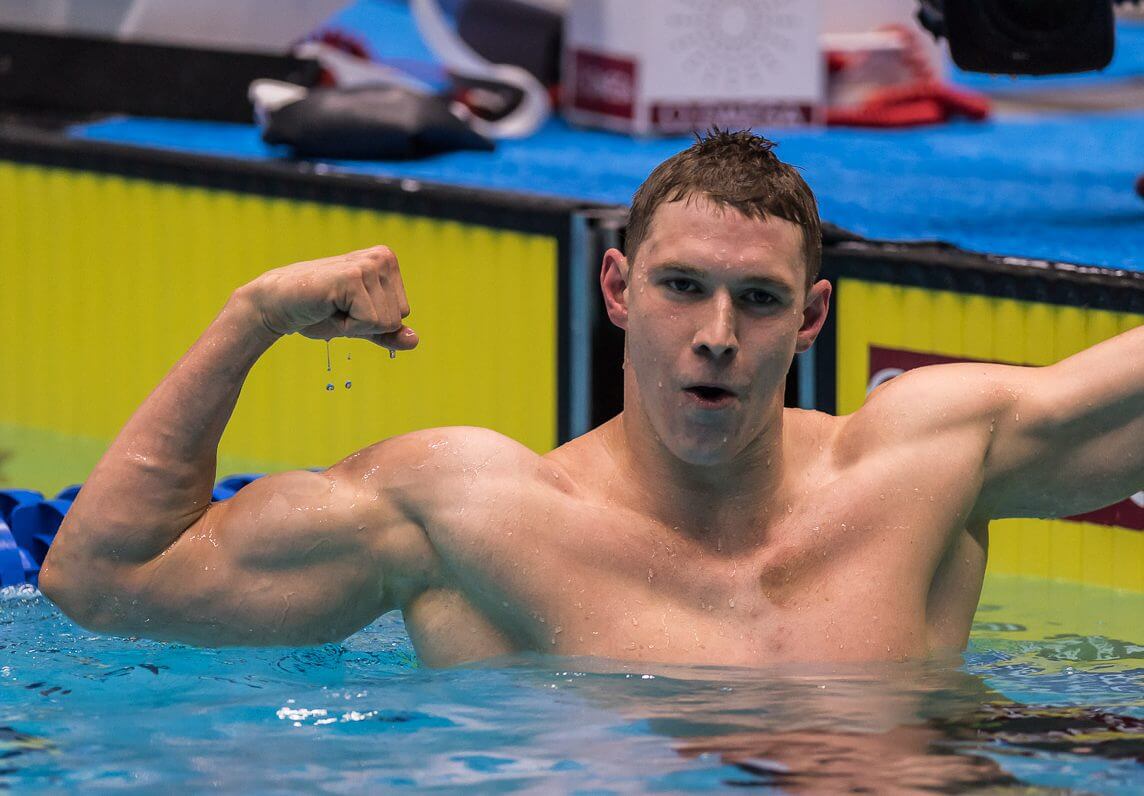Ryan Murphy Ready and Refocused for 2020 Olympic Campaign

Ryan Murphy
The January issue of Swimming World Magazine included a feature on Ryan Murphy, the triple Olympic champion from the 2016 Games in Rio de Janeiro. The profile takes a look at Murphy’s preparation for the 2020 Olympic season. The January issue can be purchased here as a PDF while subscriptions are available here.
At last year’s World Championships in Gwangju, Ryan Murphy came home with three silver medals, but his first individual long course world title still eluded him. With his focus now set on the 2020 Olympic summer, the 100 back world record holder and 2016 triple Olympic gold medalist is looking ahead to Tokyo with confidence.
When Ryan Murphy made his Olympic debut in Rio, he quickly became the world’s undisputed backstroke king, the only male swimmer aside from Michael Phelps to win multiple individual Olympic golds that week. He became just the sixth member of an exclusive group: men who have swept the 100 and 200 back at an Olympics. To cap off the week, he added his first career world record, breaking Aaron Peirsol’s 100 back mark leading off the 400 medley relay.
Almost four years later, Murphy knows he’s a better swimmer, and he has empirical evidence to back up that claim. “When I look at my training performances over the past three years, in every single aspect of my swimming, I go faster than I did then,” Murphy said. “Everything came together in Rio. I know I’m better.”
For that conviction, Murphy has no individual long course World Championship titles to show for it. There was the 2017 post-Olympic year blip, when Murphy finished third in a tightly-contested 100 back final at Worlds, and then couldn’t keep pace with Russia’s Evgeny Rylov in the 200 back. However, he looked far stronger in 2018, nearly breaking his own world record in the 100 back and swimming a lifetime best in the 200 back.
So when it came time to perform again at the 2019 World Championships, conventional wisdom suggested that Murphy would step up, even as the U.S. team got off to a sluggish start through the first several days of the meet in Gwangju.

Ryan Murphy swims backstroke at the 2018 U.S. Nationals — Photo Courtesy: Peter H. Bick
In the days before he raced, Murphy hedged his bets. Even if he was better, maybe the times wouldn’t show up yet. Even as he felt optimistic about the forthcoming meet, his final preparations felt, well, different. Not bad, but peculiar.
“We experimented a little bit in training, which I was totally a proponent of,” he said. “As I was going through taper, the way that I was feeling throughout the taper, it was a different sort of feeling than I’ve had in the past. Usually, as I move through taper, I feel like it’s the legs that really come on strong, and this year, it felt a little bit more like balance in terms of where I was feeling my improvements coming from.”
As he progressed through the 100 back qualifying rounds, he thought he was swimming faster than he was in prelims, but in the semifinals, he split 25.0 on the opening 50, much quicker than he had aimed for. And then, in the final, Murphy said it was “the first time I’d been really excited for a race all season.” He got amped up, and he went for it.
Typically, if a 100-meter world record holder who is also a 200-meter gold medalist turns first at the halfway point under world-record pace, you expect that gold medalist to hold on and deliver a signature performance. That’s why it was startling to watch Murphy labor on the homecoming length and even more shocking to see him miss the medals entirely, by a frustrating one hundredth.
“It was a very poorly executed race, and that’s kind of the way I took it,” Murphy said. “I was obviously incredibly disappointed coming off the 100 back, but I really put that more on race strategy than anything physical.”
From that point, Murphy believes he saw improvement. He swam a more controlled (but faster) race leading off the mixed 400 medley relay, and he ended up earning a silver in the 200 back behind Rylov. Murphy was much more satisfied with this swim, even if his final time and fading legs the last 50 weren’t ideal.
But then, he capped off the meet with a race where he “completely laid an egg.” Not the 50 back, where Murphy ended up fourth in a race that “I do because it’s offered,” but in the U.S. men’s 400 medley relay, where Great Britain’s Duncan Scott swam the second-fastest split in history to make up a huge deficit and pass American anchor Nathan Adrian for the gold.
After that relay, all four swimmers took the loss hard. For Murphy, his leadoff split of 52.92 had been more than a second slower than his world record of 51.85.
“That was the race that really made me the most upset out of any race I’d done at the meet,” he said. “I was incredibly disappointed in myself on that one.”
Being the Best He Can Be
With some time to reflect on Worlds, Murphy remembers some particular images of disappointment, like Xu Jiayu’s reaction after the Chinese swimmer defended his gold medal in the 100 back, and Murphy also remembers “one of the things that was said to me after the 100 back that I’m not going to get into.” But Murphy isn’t the sort of swimmer that uses setback to sustain his drive toward the next season.
“I’m not someone who needs bulletin board material. It’s not hard for me to go to practice every day and work my butt off. That’s something that’s pretty natural for me to do,” he said. “I don’t go through training having a personal vendetta about someone that had a good race. I go through training trying to be the best Ryan Murphy I can be.”
Murphy may have been a bit upset with his results from Gwangju, but he says the sting will not carry over. He took his results for what they were and is moving on.
“I fully immerse myself in the training. I draw confidence in the training,” he said. “The season is 11 months of beating yourself up in training, and then you have one month to kind of rest and show off what that training is. I honestly don’t think it’s super hard to move on from bad performances if you’re very involved in the process and really dialed into the training.”

Ryan Murphy as an ambassador for Goldfish Swim School — Photo Courtesy: Goldfish Swim School
In the end, that’s it: the training. That’s why Murphy didn’t go into panic mode after Worlds. He had some takeaways for what he could perhaps do differently in training, and when he and Cal coach Dave Durden met to discuss the new season, Murphy found out that Durden had some similar ideas on “things we could optimize more,” including conditioning sets on tighter intervals and some minor technical adjustments in his backstroke.
This season, Durden has begun coaching Murphy’s middle-distance group full time. In their seventh full season working together, Murphy and Durden never struggled with communication, but Murphy has made more of a conscious effort this season to communicate to his coach when he is feeling particularly strong in practice or when he’s getting beaten down.
“I think as I’ve been at Cal longer, I’m more open with Dave. He can speak pretty candidly with me,” Murphy said. “I think there’s just a level of investment that comes with being with someone for such a long time. Dave knows my family super well. He knows a lot more about my life, about my interests, about my relationships. It’s just a little bit more of a well-rounded relationship, as opposed to just coach-to-swimmer.”
The Big Picture
Murphy admits that he wants to be the best. Of course he does—what top-notch athlete doesn’t? In the pantheon of great backstrokers, only East Germany’s Roland Mathes has repeated as double Olympic champion in both the 100 and 200 back. Peirsol, currently considered the best American backstroker in history, fell just short, winning a second 100 back gold medal in 2008, but he settled for silver behind compatriot Ryan Lochte in the 200 back.
But that won’t frame Murphy’s quest for a second Olympics. Murphy’s deeper ambitions lie somewhere less concrete than stats, numbers and honors.
“One of the things that I was brought up with is being authentic. That’s something that I really try to do. The way I think of that is making sure that I go into every season and give it a solid, honest effort, but then also my interactions with people. I’m not someone who is going to be putting out a lot of different faces,” he said.
“What that’s leading me to is I would love to be remembered in terms of the people that I’ve inspired, as opposed to my résumé.”
That means using his name to grow the sport on a grassroots level, helping raise exposure to swimming. That also means attaching himself to the new International Swim League, with the long-term aim of raising the professionalism of swimming and providing a foundation for increased earning-power for future swimmers.
Murphy competed for the Los Angeles Current of the ISL in three meets this season, including in the finale meet in Las Vegas, and he said he’s witnessed nearly unanimous praise for the format. While he’s enjoyed watching teams forge together and develop personalities, he’s most enthused about the potential for the sport’s growth from the ISL.

Ryan Murphy celebrates a win — Photo Courtesy: Peter H. Bick
“I’m really hopeful that it can become a sustainable model. I think, among the athletes, it feels pretty unanimous that the athletes think this is a really good thing for the sport,” he said. “At this point in my career, I think this is the best opportunity we’ve had, the closest we’ve been to kind of breaking through as a sport. I think it’s awesome”
Looking ahead to the Tokyo Olympics, that will be a critical point in Murphy’s career, and even after a modest showing in Gwangju, Murphy, who will have just turned 25, will head to Tokyo as a co-favorite in both backstroke events. Given that he and his Cal teammates also dealt with their struggles in 2015, Murphy joked that “we definitely know how to move through the Olympic year better than we know how to move through the year before.” Early on in the Olympic season, Murphy has noticed a little bit extra energy on deck, from coaches, college swimmers and postgrads.
But at the same time, the Olympic year isn’t all that different. No one will be making any overhauling changes in one year. Murphy thinks about the process of getting one to two percent better “in a bunch of different areas of my life” and keeping the entire Olympics process in perspective.
“I just think everyone steps up their game a little bit in the Olympic year, but you don’t have to make it more complicated than it is,” Murphy said. “One of the nice things about being there once is, it really is just another swim meet. In terms of the competition, in terms of the people that were there, it’s the exact same as the World Championships. The only difference is there’s a lot more people watching on TV.”
In Murphy’s mind, if everything doesn’t come together perfectly as it did in Rio, that’s OK. He still plans on swimming for a long time after 2020, but when his career does end, Murphy has considered pursuing a career in finance. Borrowing a term from finance, Murphy believes he’s more hedged going into 2020 than in 2016.
“I just feel way more confident in myself in every aspect of my life as compared to going into 2016,” Murphy said. “I definitely still have that grinder mentality. I definitely feel like I have to be really good in the next year to accomplish what I want to accomplish. But it’s not, like, the end-all. I feel very confident in everything I’ve going on outside of the Olympics. I’ve got a lot of things to fall back on if, for some reason, I didn’t have the performance that I wanted to have.”


- 2016 USA TRIALS ARCHIVE
- ARCHIVES OF OLYMPIC TRIALS VIA SWIMMING WORLD VAULT
- 2021 USA OLYMPIC TRIALS WAVE I CUTS
- 2021 USA OLYMPIC TRIALS WAVE II CUTS
- HEAD USA OLYMPIC COACHES
- 2016 FULL RESULTS
- WAVE I FULL RESULTS
- PSYCH SHEET
- DAY ONE RESULTS
- DAY TWO RESULTS
- DAY THREE RESULTS
- DAY FOUR RESULTS
- DAY FIVE RESULTS
- DAY SIX RESULTS
- DAY SEVEN RESULTS
- DAY EIGHT RESULTS




Go Ryan kick some butt
Love to watch him swim!
Looking lean and mean.
???